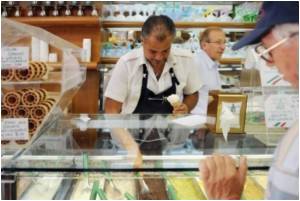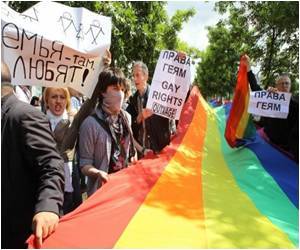
And the park is set to become one of the city's main venues for contemporary art when Dasha Zhukova, Roman Abramovich's partner, moves her Garage gallery there next year.
It's a strange turn of events for the park, which was laid out in the 1920s to show the new proletariat how to spend their free time in a more "cultured" way, with lectures and concerts.
The changes are being pushed through by the park's new director Sergei Kapkov, a close ally of the billionaire Abramovich and who was appointed by the new Moscow mayor Sergei Sobyanin in March.
"We wanted it (the clean-up) a lot -- more than the previous park management," he told AFP during a stroll in the park.
"I think Gorky Park is such a symbol of Moscow and the new mayor understands this, so we started moving quite quickly... We absolutely needed to open up the park as a public space for Muscovites."
Advertisement
He heads Abramovich's National Football Academy and ran his campaign for governor of the remote Chukotka region, which Kapkov also represented in parliament until he took up the park job.
Advertisement
Gorky Park had some fairground rides as far back as the 1960s, but the rides multiplied over the 1990s.
"Of course I was a bit worried, but we had to remove the rides in any case. They were 26 to 30 years old. They were in a damaged, dangerous state -- it was inevitable," Kapkov said.
The changes have brought new visitors to the park: locals rather than out-of-towners, he said.
"Last year, 80 percent of visitors were not Muscovites. People came here from the Moscow region for cheap rides, to drink vodka here. Now we don't trade strong alcohol. We have a completely different life," he said.
The park's programme director, Yekaterina Kibovskaya, a journalist who spent several years in New York, echoed the message.
"Everyone is sick of loud music, constantly cooking kebabs on camp fires. I think we are ready to relax in another way," she said.
"We want to show that in our park you can sit on the grass, eat buns and drink some pleasant, non-alcoholic drinks."
Signs thank visitors "for not being mean to the ducklings" and they can leave suggestions in special boxes.
"A lot of people thank us for the changes in the park but a lot of people ask about the children's rides," Kibovskaya said.
One pencilled message pleaded: "Bring back the big wheel," while another said simply: "Keep on doing what you're doing."
Visitors basking in the sun were positive about the changes.
"It's become very beautiful here after the reconstruction," said Alexander Krasnoshtanov, 20, a restaurant manager, who sat on a beanbag with his laptop.
"Mainly I use the wifi or go to the beach. I'm not bothered about the rides, but I would put some in for the children," he said.
"It's interesting for children, because you can cycle, rollerskate... The rides aren't the main thing," said a woman who gave her name as Valentina Vladimirovna, rollerskating with her two daughters.
In a move that would have once seemed unthinkable, Abramovich's partner Zhukova plans to move her contemporary art gallery Garage to the park next year.
In September, Garage will hold its first exhibition in the park as part of the Moscow biennale of contemporary art.
And in May or June next year, it will move into a temporary new home, a 1970s concrete pavilion, said the gallery's director Anton Belov.
"Maybe it's a unique experiment for Russia when we are bringing contemporary art into a park zone, and not an ordinary park, but one that is the most significant in Moscow and maybe even in Russia," Belov said.
"In the park there will be a lot of people for whom it will be the first encounter with contemporary art."
Ultimately Garage plans to move into the Hexagon, a large pavilion built in the 1920s for an agricultural fair by architect Ivan Zholtovsky, later known for classical revival Stalin-era buildings.
"It showed the first avant-garde art exhibitions, the first American cars, the first farm machinery," Belov said. "We need to give it new life."
Little remains of the original building, which was an open summer pavilion, and exactly how to reconstruct it still being discussed. Kapkov said the move could happen in four years.
Source-AFP















